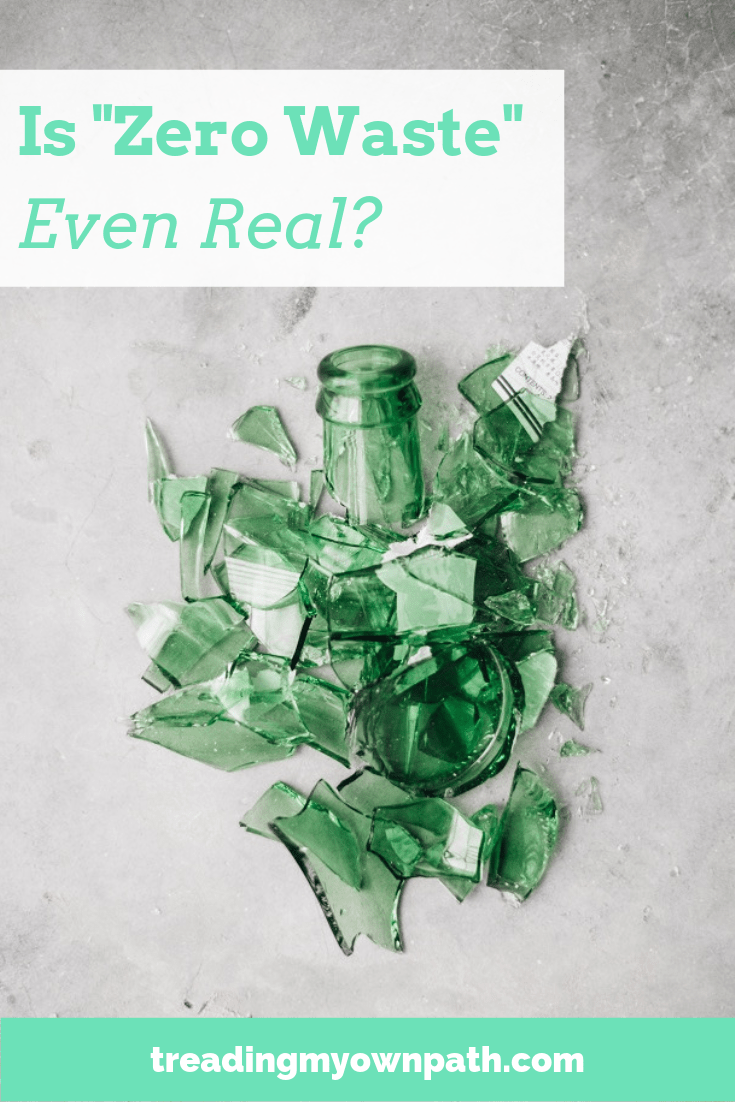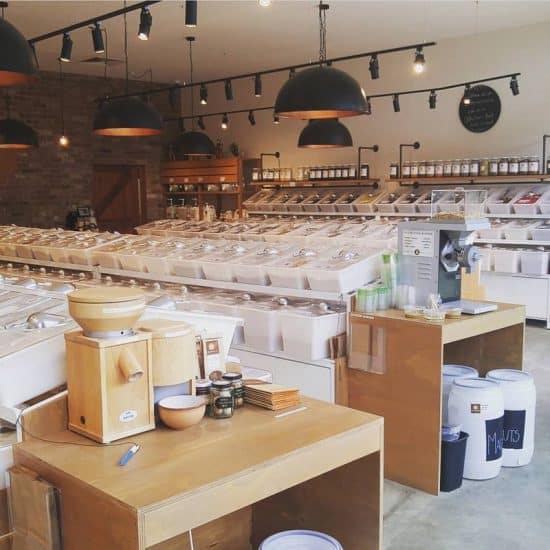Is “Zero Waste” Even Real?
For me, living zero waste means trying to create as little waste (and that includes recycling) as possible. Refusing single-use items, avoiding plastic, reducing what I purchase, and choosing items that are well made and designed to last.
For bigger, one-off purchases I try to find what I want second-hand.
For the regular, consumable things that I purchase week-to-week (think groceries, personal care products, cleaning products), I try to buy unpackaged. This means unpackaged fruit and veg from the grocer, bringing my own containers to the deli and a reusable bag to the bakery, and my own jars or reusable produce bags to the bulk store.
This way I can buy what I need without bringing home any unnecessary packaging. It means I’m not sending anything from my weekly shop to landfill: everything I purchase, I consume.
Zero waste. At least at my end.
Or is it?

What Does Zero Waste Actually Mean?
Zero waste is both a lifestyle choice and an industrial design term. Whilst they both have the same philosophy – elimination of waste to landfill / incineration – what that looks like in practical terms is a little different.
Zero waste needs to be a whole systems approach, looking at production of goods in terms of systems and design. It looks at everything, from the materials selected, how they are sourced, how they are processed, how they are transported, how they are used, and how they are re-used.
For zero waste, products need to be created in a way that allows them to be reused, not disposed of. This is the idea of the circular economy.
The circular economy is the goal, but it is not the reality. Yet.
Zero waste as a lifestyle is all about what we can do as individuals. Typically, we aren’t designing our own products. We are the end users. Our power is in choosing the most ethical, sustainable options that we can when we need to make purchases.
Supporting the companies doing the right thing, and boycotting those that do not.
These options aren’t always perfect. But they are better.
So when I say that my weekly shop is zero waste, I mean that none of the products I purchased came in single-use packaging. There is nothing going to landfill. I didn’t create any packaging waste in the process.
That’s not to say that there was no waste anywhere in the process.
That’s not to say the farmers didn’t use plastic when growing, harvesting or packing their crops.
That’s not to say suppliers didn’t use plastic to transport their goods.
There will likely be waste somewhere (and possibly, in many places) in the production and distribution of these goods.
But reducing waste at the end point – the point where we, as concerned citizens and empowered communities, can vote with our dollars about the kind of world we wish to see – that’s a start.
It’s an important start.
The zero waste movement is about doing what we can. A step in the right direction is better than no steps.
How can we take the second step without taking the first?
Zero Waste Progress Comes Before Zero Waste Perfection
It makes me sad that people sometimes dismiss the zero waste movement because they want to see perfection. They cannot see the value in zero waste progress.
Why does it have to be all-or-nothing?

I purchase my groceries packaging free from The Source Bulk Foods, an Australian bulk store which encourages shoppers to bring their own containers and refuse packaging. I describe this way of shopping as zero waste.
More than once, some cheerful soul has popped up in a comment to inform me that it isn’t zero waste because there will be waste created upstream.
I don’t dispute this statement.
I just think it’s the wrong place to be focusing.
I know that, prior to my 2012 plastic “epiphany”, I would go to the supermarket and buy all my groceries packaged in plastic.
I would buy individual pots of yoghurt, and “fun size” chocolate bars, and single serve drinks, and pre-wrapped cereal bars.
Occasionally I would go to the bulk store for spices, and when I did I would take a fresh plastic bag off the shelf, and buy my two teaspoons of spice using that bag.
{Cringe.}
I don’t shop this way any more, and I haven’t since 2012. Bulk stores are what enabled me (and countless others) to change this. They provided a solution by making package-free groceries accessible. Without them, avoiding single-use packaging would be much harder.
I’d like to tell you that the bulk stores receive all their bulk goods in reusable, returnable containers. I’d like to tell you that they don’t generate any waste. But that’s not the case.
Yet.
I mentioned the circular economy earlier. As I said, we’re not there yet. Bulk stores are enabling us (the grocery shoppers) to purchase without waste. They create waste so we don’t have to (and create far less than if each of us purchased these same products in packaging week after week).
Less, but not zero.
Bulk stores now need to work with their suppliers to find ways of receiving goods without single-use packaging.
The good news is, that’s beginning to happen.
As more and more of us support bulk stores, and demand for this kind of shopping grows, there’s more incentive for (and more gentle pressure on) bulk stores to start the conversations and take that next step.
If demand is there, it will begin to happen more and more.
We take the first step, and they take the next step.
Moving towards a more sustainable future with a circular economy and true zero waste.
That’s the future. Maybe the near future, but maybe not. In the meantime, I’ll continue to play my part and support these businesses choosing the better option. Yes, I’ll buy my groceries packaging-free, and I’ll say my shopping is zero waste.
Even though I know that bulk stores do create waste. Suppliers create waste. Farmers create waste.
Am I saying that zero waste isn’t real? If we’re talking about it on a technical level on an economic scale, in terms of definitions and what-not, then it would be fair to say that zero waste isn’t real.
But I don’t want to talk about it like that, because I don’t think about it like that. For me, the meaning of zero waste isn’t how it’s characterized in dictionaries or interpreted by textbooks.
For me, zero waste is about values, ideals and beliefs. It’s a guiding principle for the choices I make. Choices that help create a better, fairer, more sustainable future for people and the planet.
Whether or not it technically exists, zero waste is very real.
Let’s not get bogged down in the minutiae. Technical details don’t matter. What matters is that we do our imperfect best, support those companies taking the next step where we can, and champion better solutions where we see them.
Small steps, in the right direction, together.
Whether we believe in zero waste or not, we all have a part to play. Waste is something we all have control over, and can do something about. So let’s do something about it.
Now I’d love to hear from you! What does zero waste mean to you? Do you use the term yourself, or steer well clear, and why? Has your understanding and perception of zero waste changed over time? In a good way, or a not so good way? Anything else to add? Please share your thoughts in the comments below!
[leadpages_leadbox leadbox_id=1429a0746639c5] [/leadpages_leadbox]



